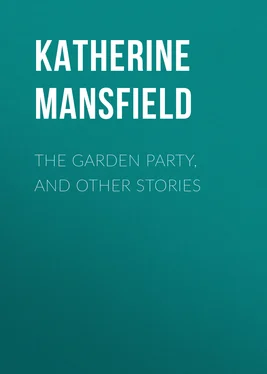Katherine Mansfield - The Garden Party, and Other Stories
Здесь есть возможность читать онлайн «Katherine Mansfield - The Garden Party, and Other Stories» — ознакомительный отрывок электронной книги совершенно бесплатно, а после прочтения отрывка купить полную версию. В некоторых случаях можно слушать аудио, скачать через торрент в формате fb2 и присутствует краткое содержание. Жанр: foreign_prose, foreign_antique, на английском языке. Описание произведения, (предисловие) а так же отзывы посетителей доступны на портале библиотеки ЛибКат.
- Название:The Garden Party, and Other Stories
- Автор:
- Жанр:
- Год:неизвестен
- ISBN:нет данных
- Рейтинг книги:3 / 5. Голосов: 1
-
Избранное:Добавить в избранное
- Отзывы:
-
Ваша оценка:
- 60
- 1
- 2
- 3
- 4
- 5
The Garden Party, and Other Stories: краткое содержание, описание и аннотация
Предлагаем к чтению аннотацию, описание, краткое содержание или предисловие (зависит от того, что написал сам автор книги «The Garden Party, and Other Stories»). Если вы не нашли необходимую информацию о книге — напишите в комментариях, мы постараемся отыскать её.
The Garden Party, and Other Stories — читать онлайн ознакомительный отрывок
Ниже представлен текст книги, разбитый по страницам. Система сохранения места последней прочитанной страницы, позволяет с удобством читать онлайн бесплатно книгу «The Garden Party, and Other Stories», без необходимости каждый раз заново искать на чём Вы остановились. Поставьте закладку, и сможете в любой момент перейти на страницу, на которой закончили чтение.
Интервал:
Закладка:
“What noise? What do you mean?” asked the rooster.
“Ss! Shut up! Listen!” They were mouse-still. “I thought I heard a—a sort of knocking,” said the bull.
“What was it like?” asked the sheep faintly.
No answer.
The bee gave a shudder. “Whatever did we shut the door for?” she said softly. Oh, why, why had they shut the door?
While they were playing, the day had faded; the gorgeous sunset had blazed and died. And now the quick dark came racing over the sea, over the sand-hills, up the paddock. You were frightened to look in the corners of the washhouse, and yet you had to look with all your might. And somewhere, far away, grandma was lighting a lamp. The blinds were being pulled down; the kitchen fire leapt in the tins on the mantelpiece.
“It would be awful now,” said the bull, “if a spider was to fall from the ceiling on to the table, wouldn’t it?”
“Spiders don’t fall from ceilings.”
“Yes, they do. Our Min told us she’d seen a spider as big as a saucer, with long hairs on it like a gooseberry.”
Quickly all the little heads were jerked up; all the little bodies drew together, pressed together.
“Why doesn’t somebody come and call us?” cried the rooster.
Oh, those grown-ups, laughing and snug, sitting in the lamp-light, drinking out of cups! They’d forgotten about them. No, not really forgotten. That was what their smile meant. They had decided to leave them there all by themselves.
Suddenly Lottie gave such a piercing scream that all of them jumped off the forms, all of them screamed too. “A face—a face looking!” shrieked Lottie.
It was true, it was real. Pressed against the window was a pale face, black eyes, a black beard.
“Grandma! Mother! Somebody!”
But they had not got to the door, tumbling over one another, before it opened for Uncle Jonathan. He had come to take the little boys home.
Chapter 1.X
He had meant to be there before, but in the front garden he had come upon Linda walking up and down the grass, stopping to pick off a dead pink or give a top-heavy carnation something to lean against, or to take a deep breath of something, and then walking on again, with her little air of remoteness. Over her white frock she wore a yellow, pink-fringed shawl from the Chinaman’s shop.
“Hallo, Jonathan!” called Linda. And Jonathan whipped off his shabby panama, pressed it against his breast, dropped on one knee, and kissed Linda’s hand.
“Greeting, my Fair One! Greeting, my Celestial Peach Blossom!” boomed the bass voice gently. “Where are the other noble dames?”
“Beryl’s out playing bridge and mother’s giving the boy his bath… Have you come to borrow something?”
The Trouts were for ever running out of things and sending across to the Burnells’ at the last moment.
But Jonathan only answered, “A little love, a little kindness;” and he walked by his sister-in-law’s side.
Linda dropped into Beryl’s hammock under the manuka-tree, and Jonathan stretched himself on the grass beside her, pulled a long stalk and began chewing it. They knew each other well. The voices of children cried from the other gardens. A fisherman’s light cart shook along the sandy road, and from far away they heard a dog barking; it was muffled as though the dog had its head in a sack. If you listened you could just hear the soft swish of the sea at full tide sweeping the pebbles. The sun was sinking.
“And so you go back to the office on Monday, do you, Jonathan?” asked Linda.
“On Monday the cage door opens and clangs to upon the victim for another eleven months and a week,” answered Jonathan.
Linda swung a little. “It must be awful,” she said slowly.
“Would ye have me laugh, my fair sister? Would ye have me weep?”
Linda was so accustomed to Jonathan’s way of talking that she paid no attention to it.
“I suppose,” she said vaguely, “one gets used to it. One gets used to anything.”
“Does one? Hum!” The “Hum” was so deep it seemed to boom from underneath the ground. “I wonder how it’s done,” brooded Jonathan; “I’ve never managed it.”
Looking at him as he lay there, Linda thought again how attractive he was. It was strange to think that he was only an ordinary clerk, that Stanley earned twice as much money as he. What was the matter with Jonathan? He had no ambition; she supposed that was it. And yet one felt he was gifted, exceptional. He was passionately fond of music; every spare penny he had went on books. He was always full of new ideas, schemes, plans. But nothing came of it all. The new fire blazed in Jonathan; you almost heard it roaring softly as he explained, described and dilated on the new thing; but a moment later it had fallen in and there was nothing but ashes, and Jonathan went about with a look like hunger in his black eyes. At these times he exaggerated his absurd manner of speaking, and he sang in church—he was the leader of the choir—with such fearful dramatic intensity that the meanest hymn put on an unholy splendour.
“It seems to me just as imbecile, just as infernal, to have to go to the office on Monday,” said Jonathan, “as it always has done and always will do. To spend all the best years of one’s life sitting on a stool from nine to five, scratching in somebody’s ledger! It’s a queer use to make of one’s… one and only life, isn’t it? Or do I fondly dream?” He rolled over on the grass and looked up at Linda. “Tell me, what is the difference between my life and that of an ordinary prisoner. The only difference I can see is that I put myself in jail and nobody’s ever going to let me out. That’s a more intolerable situation than the other. For if I’d been—pushed in, against my will—kicking, even—once the door was locked, or at any rate in five years or so, I might have accepted the fact and begun to take an interest in the flight of flies or counting the warder’s steps along the passage with particular attention to variations of tread and so on. But as it is, I’m like an insect that’s flown into a room of its own accord. I dash against the walls, dash against the windows, flop against the ceiling, do everything on God’s earth, in fact, except fly out again. And all the while I’m thinking, like that moth, or that butterfly, or whatever it is, ‘The shortness of life! The shortness of life!’ I’ve only one night or one day, and there’s this vast dangerous garden, waiting out there, undiscovered, unexplored.”
“But, if you feel like that, why—” began Linda quickly.
“Ah!” cried Jonathan. And that “ah!” was somehow almost exultant. “There you have me. Why? Why indeed? There’s the maddening, mysterious question. Why don’t I fly out again? There’s the window or the door or whatever it was I came in by. It’s not hopelessly shut—is it? Why don’t I find it and be off? Answer me that, little sister.” But he gave her no time to answer.
“I’m exactly like that insect again. For some reason”—Jonathan paused between the words—“it’s not allowed, it’s forbidden, it’s against the insect law, to stop banging and flopping and crawling up the pane even for an instant. Why don’t I leave the office? Why don’t I seriously consider, this moment, for instance, what it is that prevents me leaving? It’s not as though I’m tremendously tied. I’ve two boys to provide for, but, after all, they’re boys. I could cut off to sea, or get a job up-country, or—” Suddenly he smiled at Linda and said in a changed voice, as if he were confiding a secret, “Weak… weak. No stamina. No anchor. No guiding principle, let us call it.” But then the dark velvety voice rolled out:
“Would ye hear the story
How it unfolds itself… ”
Интервал:
Закладка:
Похожие книги на «The Garden Party, and Other Stories»
Представляем Вашему вниманию похожие книги на «The Garden Party, and Other Stories» списком для выбора. Мы отобрали схожую по названию и смыслу литературу в надежде предоставить читателям больше вариантов отыскать новые, интересные, ещё непрочитанные произведения.
Обсуждение, отзывы о книге «The Garden Party, and Other Stories» и просто собственные мнения читателей. Оставьте ваши комментарии, напишите, что Вы думаете о произведении, его смысле или главных героях. Укажите что конкретно понравилось, а что нет, и почему Вы так считаете.












